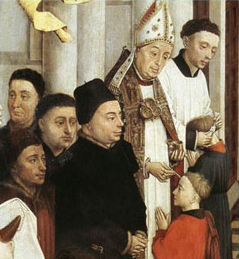 I have been enrolled in a local Catholic catechises class since last September. This class, known as the Rite of Christian Initiation of Adults, or RCIA, is designed to train unbaptized people who wish to become Christian, as well as baptized Christians who wish to enter into full communion with the Catholic Church. By design, it culminates in the Easter Vigil, at which the appropriate initiatory sacraments are administered: Baptism if not previously administered, Confirmation, and the Eucharist.
I have been enrolled in a local Catholic catechises class since last September. This class, known as the Rite of Christian Initiation of Adults, or RCIA, is designed to train unbaptized people who wish to become Christian, as well as baptized Christians who wish to enter into full communion with the Catholic Church. By design, it culminates in the Easter Vigil, at which the appropriate initiatory sacraments are administered: Baptism if not previously administered, Confirmation, and the Eucharist. Enrolling in the class was a difficult decision, but staying un-enrolled seemed no easier. I wanted to enroll because I believed I needed to be put in a more consistent pattern of training for my own discernment about the Christian Church. Prior to that point, studying Catholicism had been too easy to walk away from, then rush back into, only to walk away again upon becoming desolate over some foreign teaching or other. It was difficult to enroll, though, because I had anxiety that the momentum of the class toward the Easter Vigil would make the outcome all but inevitable.
How has it turned out? Well, I'm not even sure. I do know that there is a certain momentum toward the Vigil. But several fellow candidates are not intent on joining, so the momentum is not inescapable. The consistency of weekly study of Catholic teachings has been beneficial, even if I had previously exposed myself to most of those teachings. There has been less of a focus on the discernment process itself than I had hoped, but given that this is a one hour / week class, my hopes were misplaced.
I have been able to focus particularly on discernment itself, i.e. reflecting on God's will and calling for His people and for me in particular, through other means. Meeting with my protestant pastor and with the priest who teaches RCIA has been challenging and enriching. Best of all was a three-day silent 'retreat' I was able to attend, taught by a priest of the Institute of the Incarnate Word, which used the Ignatian Spiritual Exercises. There is nothing quite like shutting up for a few days, and committing oneself completely to prayer. Staring Catholicism, particularly Marianism, in the face for that weekend was a struggle. Here, like with my RCIA class, I did not walk away with a clean and easy answer. Discernment, like movement, is a process, and I have had to accept the necessity of patience.
So here I am, a day away from Lent and a few weeks away from the Easter Vigil, uncertain of what I will do. As a baptized Christian, I could enter at another time by making proper arrangements, so I needn't have a "now or never" perspective. I have a growing perception of how difficult Faith is, and how easy Doubt is: I can call all foreign truth-claims into doubt, and huddle in my little corner of familiarity, ignoring the forces pulling me out. Faith is so easily shattered, ever vulnerable but for the Grace of our exceedingly gracious God.
No one said this would be easy.






